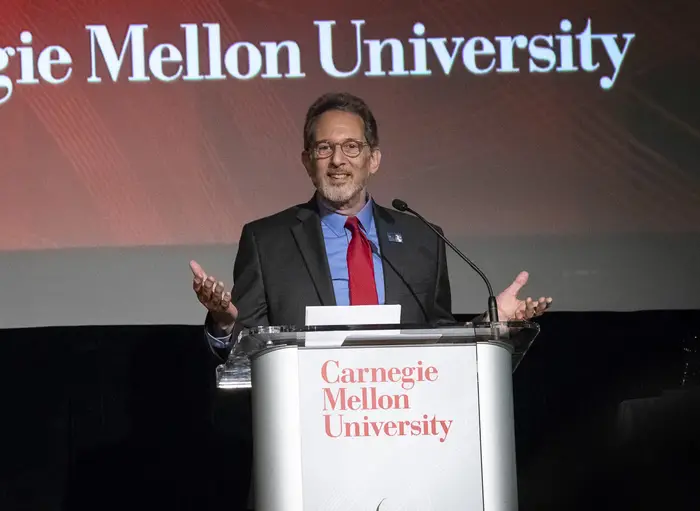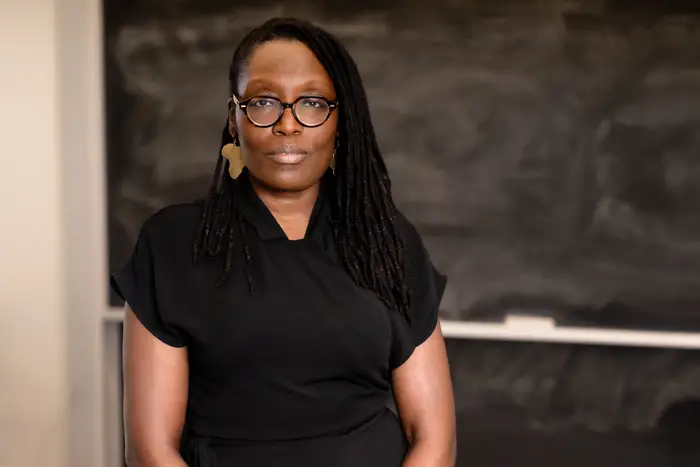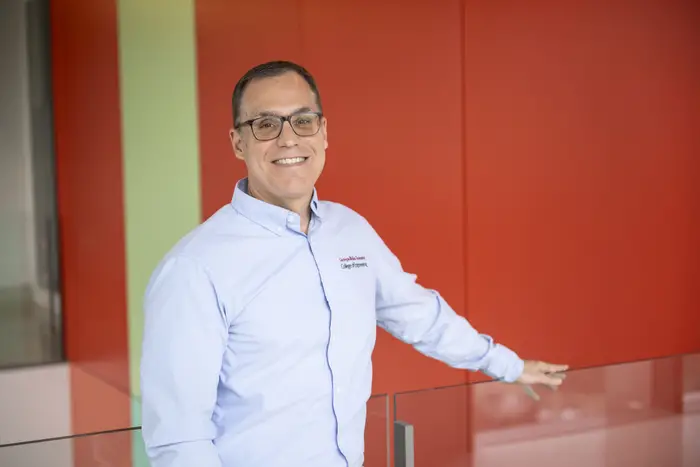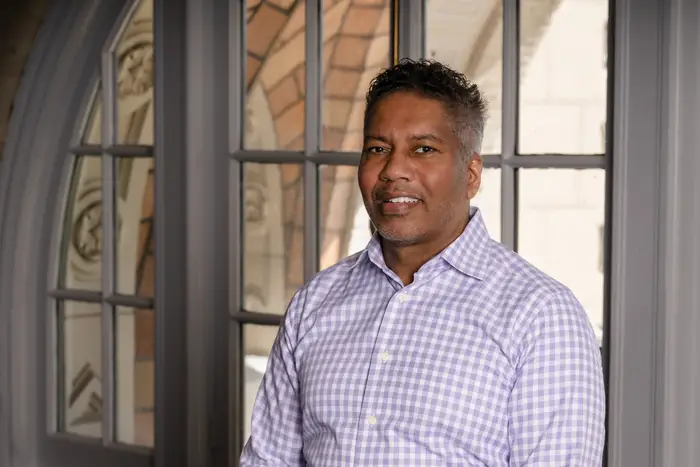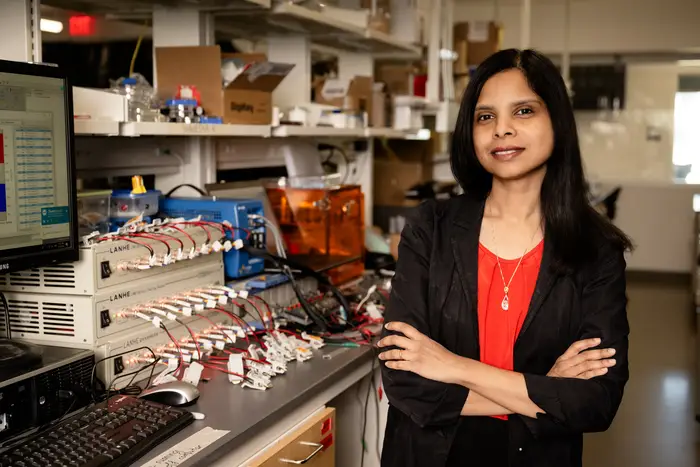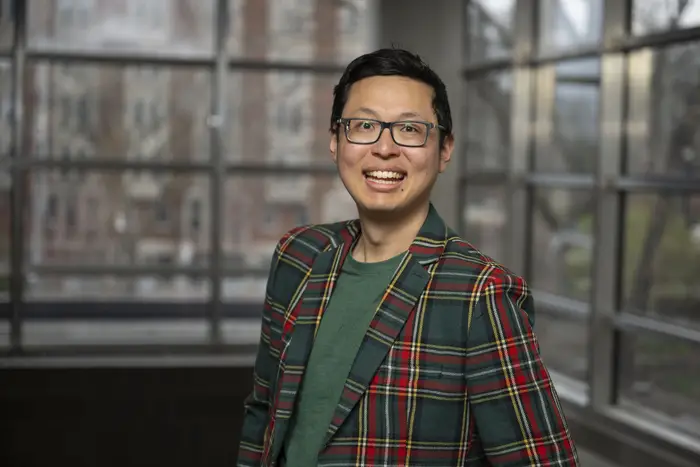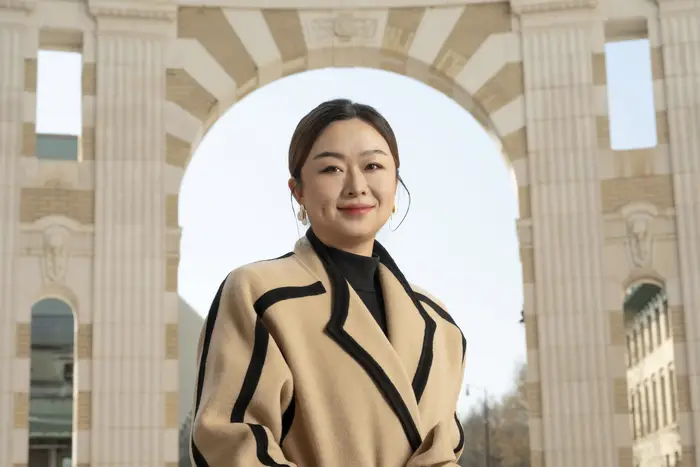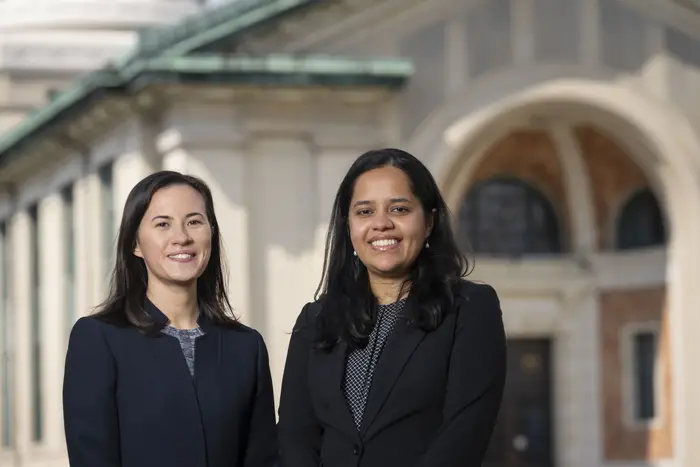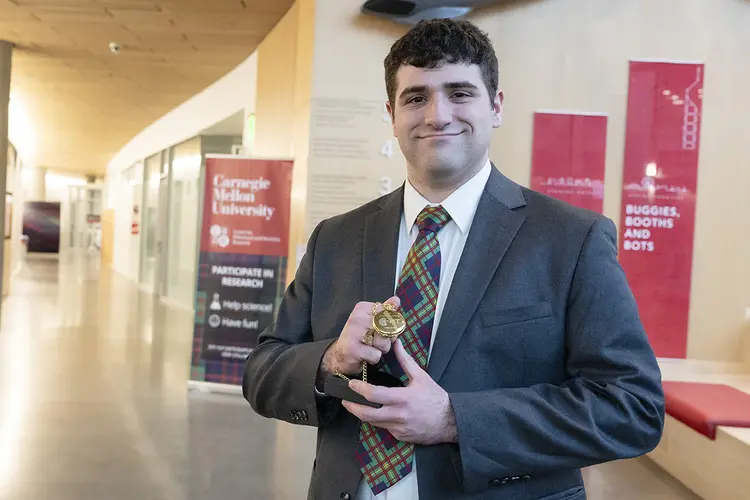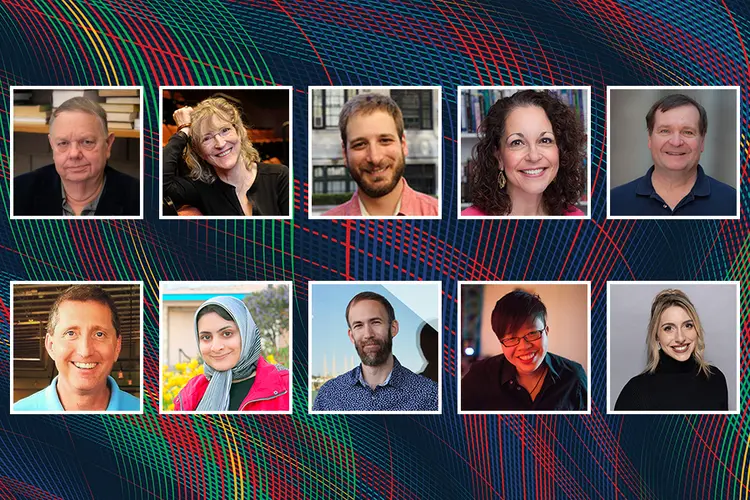CMU Celebrates Educational Leaders Across Campus
Media Inquiries
Carnegie Mellon University honors faculty, staff and graduate students for their exceptional contributions in education, teaching, advising, mentoring and service with its annual Celebration of Education Awards(opens in new window). The awards recognize the accomplishments of those who exemplify the university's standards of excellence in education, and celebrates CMU’s distinguished faculty members and educators for their outstanding contributions and devotion to the university.
Additional College Teaching Awards(opens in new window) honor exemplary teaching by faculty members within the seven schools and colleges at CMU. Each college selects their own recipient(s) based on specific criteria and they are chosen throughout the academic year, depending on the college's award cycle. See the 2023-2024 awardees(opens in new window).
The 2024 Celebration of Education Awards Ceremony will be held at 4 p.m. on Thursday, April 18, in Rangos Ballroom.
The 2024 Celebration of Education Award recipients
- Richard Scheines, Robert E. Doherty Award for Sustained Contributions to Excellence in Education
- Mame-Fatou Niang, William H. and Frances S. Ryan Award for Meritorious Teaching
- Kurt Larsen, Award for Outstanding Contributions to Academic Advising and Mentoring
- Shawn Blanton, Barbara Lazarus Award for Graduate Student and Junior Faculty Mentoring
- B. Reeja Jayan, Teaching Innovation Award
- Jerry Wang, Teaching Innovation Award
- Suzy Li, Graduate Student Teaching Award
- Isabel Murdock and Mansi Sood, Graduate Student Service Award
Robert E. Doherty Award for Sustained Contributions to Excellence in Education
Richard Scheines, Bess Family Dean, Dietrich College of Humanities and Social Sciences
For more than 30 years, Richard Scheines(opens in new window) — as professor, department head and dean — has been at the forefront of developing educational programs that benefit learners at Carnegie Mellon University and across the globe.
“Richard’s contributions run a gamut of different aspects of education at CMU, from specific interventions to organizational changes to program creation and curricular redesign,” wrote nominators Marsha Lovett, vice provost for teaching and learning innovation, Joel Smith, Distinguished Career Teaching Professor of Philosophy, and David Yaron, professor of chemistry.
Hired by the Department of Philosophy(opens in new window) in 1990, Scheines holds courtesy appointments in the Machine Learning Department(opens in new window) and Human-Computer Interaction Institute(opens in new window).
Ken Koedinger, Hillman Professor of Computer Science, noted Scheines’ early innovations, which included employing AI to create interactive tutors for learning formal logic and developing online courses for causal reasoning, were ahead of their time.
In 1997, Scheines led the creation of the undergraduate major in human-computer interaction(opens in new window) (HCI) and then served as its director for seven years.
“In addition to advising individual students, he taught and mentored student teams in the capstone project course, recruiting internal and external clients,” said Robert Kraut, Herbert A. Simon Professor of Human-Computer Interaction and University Professor Emeritus. “Students consider this course, still being taught, the highlight of the HCI program.”
As faculty lead of the Simon Initiative(opens in new window), Scheines has propelled CMU to measurably improve student learning outcomes by putting research findings into use in instruction.
“I’ve seen firsthand the tremendous impact that he has had in scaling educational innovations in ways that simultaneously leverage the learning sciences while helping to refine our understanding of how humans learn,” said Norman Bier, executive director of the Simon Initiative and director of the Open Learning Initiative(opens in new window) (OLI).
The online materials Scheines authored and refined have been used by more than half a million independent learners and students at institutions ranging from research universities to community colleges.
As part of this effort, Scheines did impactful educational research on the importance of active rather than passive learning — especially online. His work in the 2000s and more recently with collaborators Koedinger and Bier on the “Doer Effect” has influenced the design of courseware to effectively improve learning outcomes.
As dean of Dietrich College, Scheines set a bold vision to educate students to solve problems across disciplinary boundaries and to create engaged citizens through experiential learning.
“Richard recognizes that there is much more to a college education than simply attending courses,” said Kelli Maxwell, Dietrich College’s associate dean for student success. “Through revision of the General Education program(opens in new window), Richard was a strong advocate for health and well-being, self-directed learning and holistic advising as critical components to a well-rounded educational pathway.”
One of the signature curricular features Scheines introduced is first-year Grand Challenge Seminars(opens in new window). These courses, co-taught by faculty members from multiple disciplines, focus on real, complex global problems such as climate change, food insecurity or racism. In fall 2023, Scheines and Sharon Carver, Dietrich College’s associate dean for educational affairs, created and co-taught the Grand Challenge Seminar, Academic Freedom and Freedom of Speech.
Cameron Dively, a 2018 graduate, approached Scheines as an undergraduate about creating an internship program for Dietrich College students in Pittsburgh. They teamed up to create the Pittsburgh Summer Internship Program(opens in new window) (PSIP), which funds Dietrich students to intern at nonprofit, community or government organizations, or startups that engage and strengthen the Pittsburgh region.
“With the PSIP, Richard made it so that every student had the opportunity to experience a meaningful internship, regardless of personal or financial obstacles,” Dively said.
The PSIP, now endowed, has grown from 24 students at 12 host sites in 2018 to 60 students at 43 host sites in 2023. Under Scheines’ leadership, Dietrich College also recently launched a Community Engagement Fellowship Program(opens in new window).
Regardless of the project, Scheines relentlessly pursues interdisciplinary work that matters to society.
Amy Burkert, senior vice provost for academic initiatives, wrote, “We, at CMU, are beneficiaries of Richard’s vision, action and leadership, but so are the learners of today and tomorrow whose lives may be made better through his efforts to advance effective educational methods that lie at the intersection of technology and humanity.”
— Abby Simmons
William H. and Frances S. Ryan Award for Meritorious Teaching
Mame-Fatou Niang, Associate Professor of French and Francophone Studies, Director and Founder of the Center for Black European Studies and the Atlantic (CBESA), Department of Languages, Cultures & Applied Linguistics, Dietrich College of Humanities and Social Sciences.
Since her arrival at Carnegie Mellon University in 2012, Mame-Fatou Niang’s expertise on the Francophone world and dedication to education have manifested as groundbreaking projects, a first-of-its-kind center launching with a conference this month(opens in new window) and powerful courses.
Kaytie Nielsen, a 2016 graduate, recalled how meeting Niang fundamentally shaped her creative and professional trajectories. Nielsen and Niang worked together on “Mariannes Noires(opens in new window),” a documentary on Afro-French womanhood that began as a senior honors thesis(opens in new window) and continues to make an impact.
“Dr. Niang inspired me to ask tough questions, pushed me to explore with courage and kindness and trusted me to work with her on a film that addressed a major gap in French media, a project that has certainly changed my life,” Nielsen said.
Margaret Gerlach, a graduate student in the Master's in Applied Linguistics and Second Language Acquisition(opens in new window) program noted how Niang’s appreciation of student contributions inform her teaching practices.
“At the core of Dr. Niang’s research is a focus on education,” Gerlach said. “Many assignments in her class involved creating some form of instructional material, and she would often come into class and tell us that she had shared our work with a colleague in Paris, Amsterdam, Boston or one of many other various locations, for them to use with their students. Not only did this make us feel valued and proud of our contributions to the field, but it also helped to inform educational practices elsewhere, allowing other educators to teach the next group of students about the topic.”
Niang’s lessons are transferable to all students regardless of their major. Louis Plottel, a 2021 graduate of the College of Engineering, remembers the three courses he took with Niang in the Department of Languages, Cultures & Applied Linguistics(opens in new window) as highlights of his time at CMU.
“As an engineering student, it was really enjoyable to take classes in a distinctly non-STEM discipline taught by a professor at the forefront of her field,” Plottel said. “The energy, passion and intellect Dr. Niang brought to the classroom, combined with the innovative ways she wove in the works of others in her field, made her classes some of the best I have taken at CMU, and I know many of her other former students feel the same. Her courses left a lasting and positive impact on my development, both personally and professionally.”
— Stefanie Johndrow
Award for Outstanding Contributions to Academic Advising and Mentoring
Kurt Larsen, Assistant Dean for Undergraduate Studies, College of Engineering
Kurt Larsen(opens in new window), assistant dean for undergraduate studies, advises as many as 200 first-year students, coordinates the First-Year Orientation and Honors Research programs, organizes the CIT Day and Real-World Engineering events, serves as a valued member of numerous university and college committees, and has been the longtime adviser to the Engineering Student Council(opens in new window) and the Carnegie Mellon Solar Racing(opens in new window) student groups.
He has helped countless students navigate the transition to college, manage the rigors of a demanding engineering curriculum and overcome the unexpected challenges they sometimes encounter during their first year.
Senior Vice Provost Amy Burkert may have captured it best when she said, “Kurt is their guide, cheerleader, confidante and coach but is not afraid to give them tough love and hold them to the same high standards he sets for himself.”
Larsen can be found in his office and on campus with his beloved chocolate Labrador retriever, Mudge, a certified therapy dog who, like Larsen, loves to bring a welcome dose of stress relief and fun to Carnegie Mellon students.
— Lynn Shea
Barbara Lazarus Award for Graduate Student and Junior Faculty Mentoring
Shawn Blanton, Associate Department Head for Research, Joseph F. and Nancy Keithley Professor, Electrical and Computer Engineering, College of Engineering
Shawn Blanton(opens in new window) has been an outstanding pillar of support for numerous students, encouraging them to pursue opportunities and providing invaluable guidance in the right direction.
Blanton is also committed to enhancing the representation of underrepresented minority (URM) groups in science and engineering. Every year for more than two decades, he has visited the annual National Society of Black Engineers (NSBE) convention, as well as his alma mater, Calvin University, to encourage prospective graduate students to consider CMU. He has also recruited students from other URM-centric events, such as the Society of Hispanic Professional Engineers (SHPE), the Tapia workshop for URM and low-income students, and the American Indian Science and Engineering Society (AISES).
“I have watched the university go from having a dismal number of members of color in engineering to becoming a nationally recognized college for having diverse members, and we have Shawn’s leadership to thank for that,” said Sossena Wood, assistant professor in the Department of Biomedical Engineering.
During the pandemic, Blanton supported ECE students by organizing online social events to help them destress and build a sense of community. He also provided mentorship to families at The Neighborhood Academy, a middle and high school for underserved students not far from CMU, helping to ensure they received their stimulus checks.
“Shawn could easily have paid much more attention to his own research and teaching and avoided all of the extra time he spent on mentoring others. But that is not in Shawn’s DNA,” said Jim Garrett, provost and chief academic officer. “He is compelled to help other students and faculty of color to be recruited, welcomed and supported at Carnegie Mellon. He goes well above the call of duty because he truly cares about helping the next generations succeed at Carnegie Mellon.”
— Emily Liu
Teaching Innovation Award
B. Reeja Jayan, Associate Professor, Mechanical Engineering, College of Engineering
Reeja Jayan(opens in new window), associate professor of mechanical engineering, received the Teaching Innovation Award in recognition of her work in Materials and Their Processing for Mechanical Engineers, an upper-level course that uses the game Minecraft to demonstrate key concepts such as polymer deposition and molecular structure.
With her work being at the intersection of electromagnetics and materials science, focusing on the development of low-cost and long-lasting batteries, it’s no surprise that Jayan’s knack for innovation extends to the classroom, where she’s reimagined how students learn foundational engineering skills.
“I think this is the very first time such a class existed in higher education — it’s definitely the first engineering course of its kind,” said Jayan.
Jayan kick-started this project in 2016 with the help of student interns Miguel Brandao and Takumi Natsume from the College of Engineering(opens in new window) and the College of Fine Arts(opens in new window), respectively. Natsume, a senior in the School of Art(opens in new window), says that taking Jayan’s course was a valuable learning experience even though he doesn’t study engineering.
“At times, it is hard for an artist to be aware that the skills they have are gifts, especially in an academic environment where everybody is coding away,” said Natsume. “However, Professor Jayan isn’t hesitant about accepting and valuing ideas or people outside of her field.”
— Giordana Verrengia
Teaching Innovation Award
Jerry Wang, Assistant Professor, Civil and Environmental Engineering, College of Engineering
Jerry Wang(opens in new window) has spent his career lifting others up. It is fitting then that he has been awarded this year’s Teaching Innovation Award for creating his end-of-semester “Participation Shoutouts!” activity. In the exercise, students are encouraged to submit short statements of gratitude for other students in the class who have helped them or had a positive effect on them or their studies.
Wang has been creating shoutouts to inspire and uplift others around him for years, going back to his time as a student at MIT. He has become known by his students for his humor and playfulness, which are combined with his emphasis on making sure students really learn class material.
Former students remember Wang and his enthusiasm fondly. Emerson Collins, a 2023 graduate, wrote, “Although I interacted with many amazing professors at CMU, none were quite as genuinely engaged as Jerry. From interactive games (ex. shooting nerf guns at walls to understand statistical distributions) to cooperative team projects, there was never a dull moment in Jerry’s classroom.”
Students credit the “Participation Shoutouts!” for helping them in their studies at CMU. “I have found this practice to increase both my long-term absorption of the material and my overall happiness. By writing down what people did that helped me, I can remember for longer the actual material of the course,” said Alex Wang, a current student.
Vincent Cheng, another current student, said, “Writing participation shoutouts helped remind me of the camaraderie and the importance of teamwork in the context of large projects or grasping complicated concepts, a situation all too common in engineering and in Carnegie Mellon as a whole.”
Wang’s aim with “Participation Shoutouts!” is to reduce friction to expressing gratitude. “There is little I believe more firmly than this—our campus (not to mention our country and our body politic) would be so much the better if more people regularly engaged in the conscientious expression of gratitude,” he said.
— Sarah Maenner
Graduate Student Teaching Award
Suzy Li, School of Architecture, College of Fine Arts
Doctor(opens in new window)al student and graduate instructor Suzy Li’(opens in new window)s teaching philosophy statement is prefaced by a quote from William Butler Yeats: “Education is not the filling of a pail, but the lighting of a fire.”
In her years of serving as a teaching assistant, adviser, instructor and mentor in the School of Architecture, she has lit this fire in students and inspired them to pursue their individual research interests, guided by her experience, empathy and technical expertise.
She writes: “My overarching goal is to continually refine my teaching approach and foster an even more inclusive and engaging learning environment.”
Li is a fifth-year Ph.D. candidate in Building Performance and Diagnostics(opens in new window) who previously earned master's degrees in urban design(opens in new window) and architecture(opens in new window) at CMU in 2013 and 2014, respectively. Throughout her time as a student, she has worked as a teaching assistant for numerous faculty in the school, many of whom describe her as an invaluable colleague. Since 2021, she has co-instructed the course Environmental Systems: Climate & Energy in Buildings with Vivian Loftness(opens in new window). Last year, Li began teaching her own course, Urban Design Media: Emerging Media.
The Urban Design Media course grew out of Li's extensive use of ArcGIS for her thesis. There was no advanced ArcGIS course in the school at the time of her qualifier exam, and after hearing the plan for her thesis, Li's committee recommended that she teach such a course. She submitted a proposal for a mini course, but was offered the opportunity to teach a full semester-long course. A required core course in the MUD curriculum, this was no small assignment.
Li took advantage of resources available to her, including the Eberly Teaching Center(opens in new window), which she has involved consistently each semester to help her fine-tune the course material and assignments. She also completed the Eberly Center’s Future Faculty Program(opens in new window), saying: “I learned a lot about teaching inclusively, how to do active learning, how to keep the students engaged during the lectures, and how to use different strategies to help them learn the difficult thing through an easier process.”
Rather than simply lecturing or handing out assignments, Li now sees herself as a steward to help students on their learning journey and allows their interest to guide her teaching. “As an instructor, what I benefit from most is listening to my students. What do they need? What are they thinking about the things I’m teaching? What are the topics they are interested in?”
Li says the faculty members she has worked with have had a big impact on her, particularly Loftness, whom she admires for her communication with students and desire to help them learn beyond just achieving a good grade. Li says she carries this spirit into her own course.
— Christi Danner
Graduate Student Service Award
Isabel Murdock and Mansi Sood, Department of Electrical and Computer Engineering, College of Engineering
Isabel Murdock(opens in new window) and Mansi Sood(opens in new window), doctoral students in the Department of Electrical and Computer Engineering(opens in new window) (ECE), received the Graduate Student Service Award for their contributions in uplifting their peers and creating an inclusive learning environment for all.
One of their recent efforts was the first-ever Pittsburgh Women in Mathematics and Computing Symposium(opens in new window) (WMCS), hosted in February 2023. The conference brought together 54 attendees and 15 faculty speakers from various scientific disciplines across multiple universities in Pittsburgh.
Murdock is a fourth-year Ph.D. student in ECE, researching intervention strategies for mitigating the spread of misinformation on social media. She has mentored undergraduate students as an ECE peer adviser and provided department tours as an ECE student ambassador tour guide. She has volunteered at multiple ECE Ph.D. open houses, providing campus tours in 2022 and organizing a scavenger hunt in 2023. Murdock also has assisted ECE outreach with SPARK Saturdays(opens in new window), weekend lab events that expose high school students to the field of ECE.
Sood is a final-year Ph.D. student in the ECE, researching ways to make sociotechnical systems more trustworthy and efficacious. She has served on the ECE Diversity, Inclusion, and Outreach (DIO) Committee, launching the ECE peer mentoring program and organizing social events to foster a sense of community in the department. Sood also has served as an event coordinator for the ECE Graduate Organization(opens in new window), hosting fundraisers to support local nonprofit organizations.
“They have demonstrated a commitment to service and diversity, inclusion and outreach efforts throughout their time at Carnegie Mellon University,” said Giulia Fanti, assistant professor in ECE, who mentored Sood and Murdock as they organized the Pittsburgh WMCS.
“Together, they embody the best of our institutional values,” said Osman Yağan, a research professor in ECE who has served as a faculty adviser to both Sood and Murdock. “Their countless initiatives for supporting their peers and the broader community, amid pursuing deep and impactful research, is a testament to their extraordinary character, sincerity, strong ethics and commitment to empowering those around them.”
— Emily Liu
